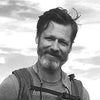Tinker Juarez probably wouldn’t be a very good accountant. Or salesman.��Or really any kind of desk jockey. And he knows that. The 58-year-old mountain-biking legend��has been riding��since he was 13, and while he doesn’t regret��his life choices, occasionally he thinks about other avenues when he’s on his bike, passing people commuting to work. “I don’t know what I’d be doing if I wasn’t riding,” he says. “I can’t see myself sitting in any kind of building all day. Maybe I’d be a gardener and mow lawns. I know I’d work hard at it though.”
It’s Juarez’s dedication that has helped him become an icon in the mountain-bike world. Born David Juarez (his family gave him the nickname Tinker), the��Angeleno started his career as a BMX racer,��becoming one of the early superstars of the sport in the 1970s. After 15 years racing BMX and riding freestyle, he switched to mountain biking��in 1986 and began to rack up��a long list of accomplishments, including��multiple national championships, two appearances at the Olympics, and countless single-race wins. Now, after��more than three decades as a professional mountain biker, he’s still��salaried��with Cannondale, his bike sponsor since 1994, and racing��at the elite pro level most weekends of the season. “My job is riding my bike, and I still have to go to work for eight hours every day, just like you,” Juarez says. “Every year when my contract is up, I don’t know if I’m gonna get another one. I try to train hard every year and try to keep the racing lively and stay busy.”
Juarez was an early adopter of BMX—when he was just a teen, he and his friends claimed a dirt mound on a vacant lot in their neighborhood in East Los Angeles, using shovels to build jumps and berms. They put fenders and mud flaps on their single-speed Schwinn bikes to make them look like motorcycles. Even then, Juarez had a stellar work ethic, riding his BMX daily, hitting jump after jump for hours after school. “It’s just practice,” Juarez says. “Like anything else, you have to dedicate yourself to it. For me, BMX was about constant repetition.”
“My job is riding my bike, and I still have to go to work for eight hours every day, just like you.”
Juarez’s hard work led him to podium finishes, sponsorships,��and the honor of being dubbed King of the Skateparks by Bicycle Motocross Action magazine in 1980. But unlike many BMX riders, he was also into the endurance side of the sport and would cycle��from his house��for several miles to hit different parks throughout the city. Eventually, Juarez says, he felt like “the old man at the gates” at BMX competitions, so he started looking for a new challenge. His knack for pedaling��served him well when he transitioned out of that type of cycling��and into mountain biking��in the mid-eighties, soon becoming a star in the��burgeoning��sport.
“After 15 years of riding bikes with just one gear, it felt really good to have six gears on a mountain bike to choose from,” Juarez says. “And the technology in mountain biking was growing so fast. I look back and can’t believe what I was riding in 1990 compared to what I ride today. I don’t think I could ever go back to racing a 26-inch wheel again.”
Juarez spent decades at the top of the mountain-bike world, carving out a niche for himself in nearly masochistic��endurance events. He��owned the 24-hour solo mountain-bike category in the early 2000s, winning dozens of grueling overnight races and��consecutive 24-hour solo national championships from 2001 to 2004.
More than 19 years after being inducted into the Mountain Bike Hall of Fame—an honor that typically comes after an athlete’s career is over—Juarez is still competitive in endurance events: he won��the Maah Daah Hey 100 in the North Dakota Badlands��in 2018��and topped��the podium at the��UCI Masters Mountain Bike World Championship��in Quebec in 2019.
Juarez credits his late-career success to his consistent training schedule, which has him riding daily, tackling��at least 300 miles and 20,000 feet of elevation each week. He also typically puts in three long, 70-plus-mile rides a week on his road bike in the mountains outside��L.A. Other days will see��him doing hill repeats behind his house. “I’m always pushing hard,” Juarez says. “I always know that each day could be my last chance to ride, so I don’t want to cut myself short.”
This year, Juarez’s schedule is as busy as ever. Beginning in the spring, he’ll compete every weekend, mostly in the pro division, and will try to defend his UCI masters world championship in France this summer. He has races scheduled in Australia and Portugal, and he’s started dabbling in gravel events, which he says suits his natural climbing ability. At 58, Juarez says he still feels great—as long as he gets enough sleep. The only time he feels his age is when he has to travel to an international event:��the time change, loss of sleep, and routine disruption wreak havoc on his��performance.��“If I can’t sleep, I’m screwed,” Juarez says. “Racing for eight hours after being up all night? You can’t have a bad night and race guys half your age.” Juarez combats shifts in his schedule by showing up to international events several days beforehand to give his body time to adjust.
Jet lag aside, Juarez feels great and sees no end��in sight for��his professional mountain-bike career. “I guess riding your bike is good for your health,” he says. “I’m still riding hard races, and the only guys ahead of me are half my age. But I’m always trying to win.”


